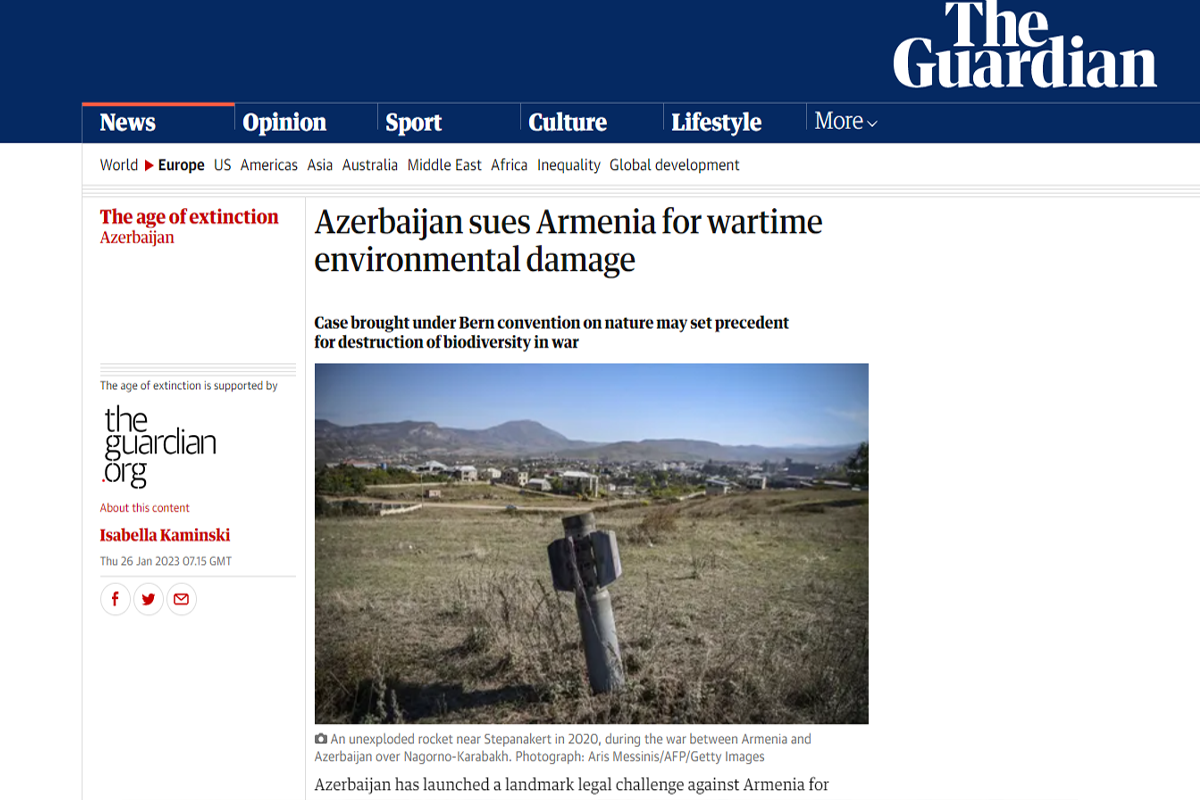Great Britain's "The Guardian" publication published an extensive article on the case filed by Azerbaijan against Armenia at the International Court of Justice.
APA reports that the article emphasized that Armenia is accused of attacking the environment and biodiversity in Karabakh, which it occupied for 30 years.
It was noted that Armenia will be required to pay compensation from the international tribunal, which will consider the evidence of widespread destruction of the environment, including deforestation and pollution, during the conflict.
The article emphasized that with this event, for the first time, any country applies to interstate arbitration based on the Berne Convention, and if Azerbaijan wins this case, it will set a precedent for assigning an economic value to biodiversity and environmental damage.
The article shows that after the war between Azerbaijan and Armenia in the early 1990s, after the collapse of the Soviet Union, Armenian forces controlled Karabakh for about 30 years, until Azerbaijan launched a counterattack in September 2020: "Azerbaijan states that the territories are returned while returning (wild nature-ed.) found that habitats and species were damaged, natural resources were depleted and biodiversity was destroyed.
It was added that Azerbaijan, located at an important strategic point between Europe and Asia, is also a biological crossroads for plant and animal species.
"According to the Ministry of Ecology and Natural Resources of Azerbaijan, during the occupation (illegal) mining industry damaged many forests that are centers of biodiversity and home to rare, endangered and endemic species such as the Caucasian leopard, brown bear, gray wolf, desert eagle.
According to the Ministry, more than 7,000 hectares of reserve territory were damaged.
Some of these reserves were created for the protection of rare and sensitive ecosystems, such as the East Chinar forest in the Basitchay (State Nature Reserve) gorge.
It is reported that ancient trees, some of which are 2000 years old, have been cut down in the war zone.
These trees are culturally important, in addition to regulating microclimates and protecting biodiversity," the article said.
The material shows that the report of the UN Environment Program last year contained information on the discovery of serious damage to agricultural lands and water management systems in the territories freed from occupation of Azerbaijan.
It was noted that the coal mine and quarry works in Chardagli were carried out without appropriate environmental control, which created risks of chemical pollution and sedimentation.
In the article, it was emphasized that the mines buried by the Armenians also lead to environmental problems: "Mines that kill cattle and wild animals and cause fires remain a problem."
It was reported that Azerbaijan violates its obligations under the Berne Convention regarding the preservation of wild flora and fauna, protection and restoration of habitats, and protection of specific species, including migratory ones.
It was added that Azerbaijan's representative in the arbitration, Deputy Minister of Foreign Affairs, Elnur Mammadov, said that Armenia destroyed biodiversity and the environment during the occupation, instead of protecting it, and that Azerbaijan tried to solve the issue diplomatically for more than 18 months.
"Unfortunately, Armenia blocked Azerbaijan's efforts and ignored it.
Therefore, we have no choice but to start these procedures to hold Armenia accountable for its irresponsible damage to the environment," said Elnur Mammadov.
It added that both Azerbaijan and Armenia have 3 months to appoint arbitrators, who will review evidence of damages and decide how much Armenia should pay in compensation:
"Armenia, a signatory of the Berne Convention, is legally obliged to respect the verdict."
Zaneta Sedilekova, a lawyer at the Clyde & Co. law firm operating in London, told The Guardian that Azerbaijan's success in the case will strengthen the preservation, protection and restoration of biodiversity, and this precedent will have a significant impact on state and non-state actors: "Azerbaijan's case If successful, this will be the first case of an arbitral tribunal awarding compensation for environmental destruction, economic evaluation of biodiversity loss and ecosystem damage in specific areas and countries.
It is mentioned in the article that Azerbaijan wants the international tribunal to order Armenia to stop its activities that damage the environment and are still ongoing, in addition to paying compensation.
"Analysis conducted by Azerbaijan in Okchuchay in 2021 showed a high concentration of heavy metals, including cadmium, lead, nickel, iron, molybdenum and zinc, in the water and sediments.
Azerbaijan says that some protected species of fish and amphibians are under threat, and the problem stems from pollution of the river's upper reaches in Armenia by wastewater from copper and molybdenum mines, as well as domestic waste.
In the report of the UN Environment Program, it was noted that the pollution of Okchuchay has been a cause of concern in Armenia for a long time.
It states that
It is mentioned in the article that it is impossible to contact the Armenian government to give an opinion on the issue.
